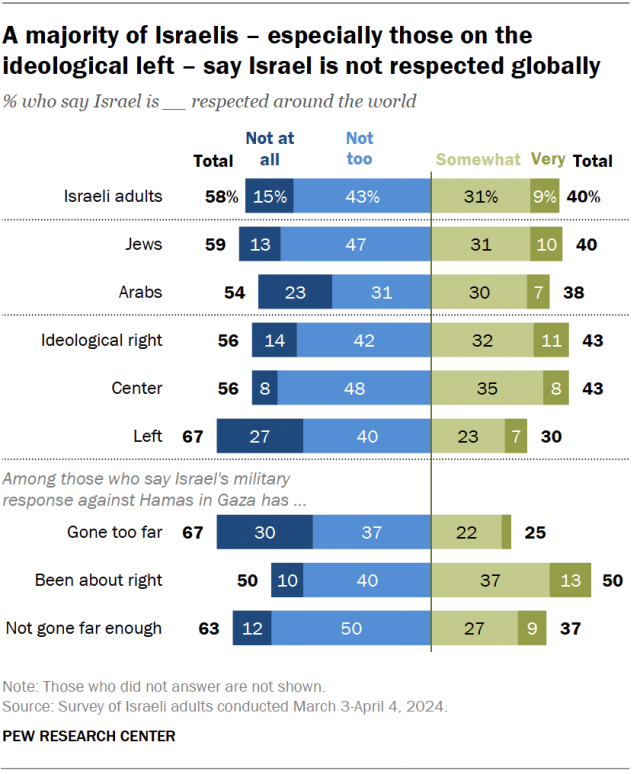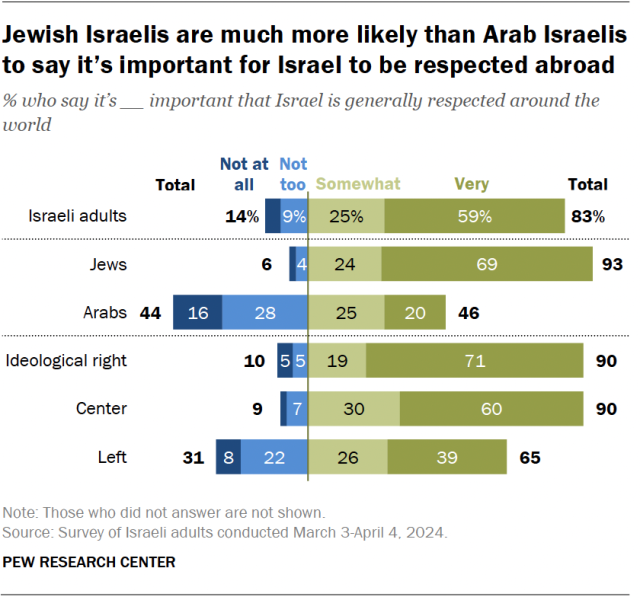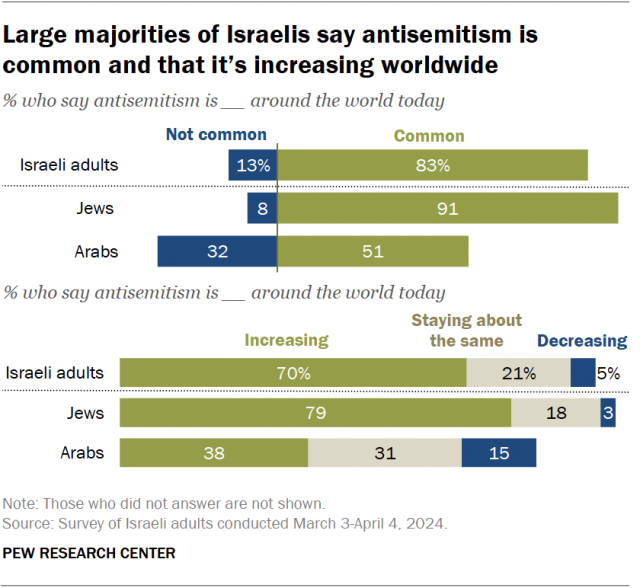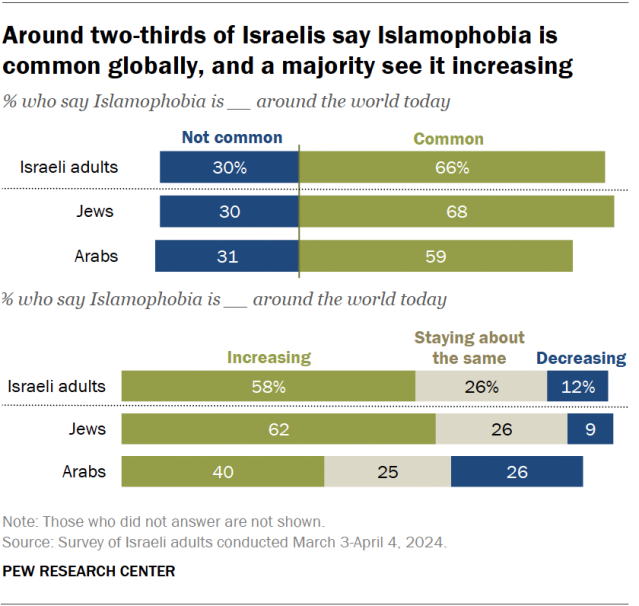
Even before a prosecutor at the International Criminal Court called for the arrest of Israel’s prime minister, Israelis were concerned about their country’s global image. Nearly six-in-ten (58%) said in a poll this spring that Israel is not respected around the world.
This Pew Research Center analysis examines Israelis’ views of their country’s global image, as well as their perceptions of antisemitism and Islamophobia around the world.
The data is from a survey of 1,001 Israeli adults conducted face-to-face from March 3 to April 4, 2024. Interviews were conducted in Hebrew and Arabic, and the survey is representative of the adult population ages 18 and older, excluding those in East Jerusalem and unsanctioned outposts. (The survey also did not cover the West Bank or Gaza.) The survey included an oversample of Arabs in Israel. It was subsequently weighted to be representative of the Israeli adult population with the following variables: gender by ethnicity, age by ethnicity, education, region, urbanicity and probability of selection of respondent.
Here are the questions used for this analysis, along with responses, and the survey methodology.
Most Israelis also feel that antisemitism and Islamophobia are common and that both kinds of prejudice are on the rise globally, according to the survey of 1,001 Israeli adults conducted from March 3 to April 4, 2024. Here’s a closer look at the survey’s findings:
A majority of Israelis do not think their country is respected internationally

A 58% majority of Israelis say their country is not respected around the world, including 15% who say it’s not at all respected.
A smaller share of Israelis (40%) say Israel is respected internationally, including 9% who say it’s very respected.
Israelis who place themselves on the ideological left are especially likely to say that their country is not respected internationally. Two-thirds of Israelis on the left hold this view, including around a quarter (27%) who say Israel is not at all respected abroad.
Views on this question also differ depending on how Israelis perceive their country’s war against Hamas. Israelis who believe the country’s military response against Hamas has gone too far are especially likely to believe that Israel is not respected around the world. By comparison, Israelis who think their country’s military response has been about right are more likely to say that Israel is respected abroad.
Most Israelis want their country to be respected abroad

Although only 40% of Israelis think their country is respected internationally, the vast majority (83%) think it’s very or somewhat important for the country to have this kind of global respect. That includes 59% who say it is very important.
Jewish Israelis are much more likely than Arab Israelis to place importance on international respect for Israel (93% vs. 46%). Indeed, among Jews, nearly seven-in-ten say this is very important.
Israelis on the ideological right (90%) and in the center (90%) are more likely than those on the left (65%) to feel it’s important for Israel to be respected abroad.
Israelis see rising antisemitism around the world

Most Israelis (83%) think antisemitism is common around the world, with nearly half (49%) saying it’s very common today.
Jewish Israelis are more likely than Arab Israelis (91% vs. 51%) to say antisemitism is common globally. So are Israeli adults on the ideological right (91%) and in the center (83%) when compared with those on the left (72%).
A majority of Israelis (70%) also think antisemitism is increasing around the world today. An additional 21% say it’s staying about the same, while just 5% think it’s decreasing.
Israeli Jews are more likely than Israeli Arabs to perceive an increase in antisemitism (79% vs. 38%). But among Arabs, younger people – those under 50 – are more likely than older ones to think antisemitism is on the rise globally (42% vs. 28%).
Israelis also see growing Islamophobia around the world

Two-thirds of Israelis think Islamophobia is common around the world today, with around a third (34%) saying it’s very common.
Israeli Jews are less likely to say Islamophobia is common than to say the same about antisemitism (68% vs. 91%). But they are still more likely than Israeli Arabs (59%) to see Islamophobia as common (and more likely to offer an opinion on the question).
A majority of Israelis (58%) also think Islamophobia is increasing around the world. Another 26% say it’s staying about the same, while 12% say it is decreasing.
Israeli Jews are more likely than Israeli Arabs to say Islamophobia increasing around the world (62% vs. 40%), while Arabs are more likely than Jews to say it’s decreasing (26% vs. 9%). The two groups are about equally likely to say it’s staying the same.
Note: Here are the questions used for this analysis, along with responses, and the survey methodology.
